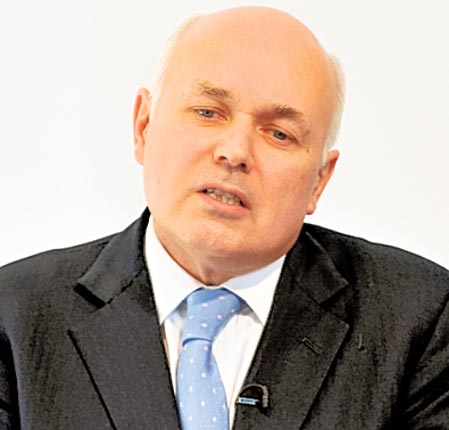Reform of benefit system could see introduction of London weighting

Benefit levels could be varied around the country to reflect the cost of living in different regions under plans for a radical revamp of the welfare state.
Iain Duncan Smith, the Work and Pensions Secretary, published wide-ranging proposals yesterday in an attempt to simplify the benefit system, including rolling more than 50 allowances into a "universal credit".
A surprise inclusion was the suggestion that benefit levels could be "localised" between different parts of the country.
Mr Duncan Smith said: "I am very keen to see what we can do to make sure that the delivery of benefits, and the calculation of benefits, is closer to people. Right now this is a very faceless set-up, very difficult to understand, and often set by people many, many miles from those who live there."
Asked whether the move could lead to lower payments for claimants in Newcastle than those in London, he told BBC Radio 4: "We want to talk to people from different areas to see whether or not they would prefer that."
Last night, Labour denounced the proposal – which is also likely to cause qualms among Liberal Democrat members of the coalition – as a return to the 18th century.
Yvette Cooper, the shadow Work and Pensions Secretary, said: "Localising benefits would mean a postcode lottery, where the support people receive would be determined by their address, not their needs."
Mr Duncan Smith delivered a damning assessment of the benefits system, describing it as "antiquated" and "on the verge of breaking down". He said it trapped claimants into "ghettos of worklessness" where they were better off living on allowances and tax credits than taking a job.
One option floated yesterday was for all benefits to be scrapped for people who find work. They would receive tax breaks to ensure they had more money than when they were on the dole. Alternatively, a taper system could be introduced under which benefits are gradually phased out as a person's pay increases.
His report was a consultation document, but government sources said rapid action would follow to overhaul the structure of benefits.
Critics raised fears that the plans would lead to cuts in levels of allowances. The report warned: "Demographic changes mean that the cost of the welfare system is predicted to rise at a time when we can least afford it." Brendan Barber, the secretary general of the TUC, said: "While the aim behind this certainly has merit, ministers have a big problem.
"Either you make those who are out of work poorer – yet we already have jobless benefit levels way below those when Mrs Thatcher was in power.
"Or you can boost income in work either through more generous benefits or a higher minimum wage. The first should be morally unacceptable, while the Treasury will not allow the second."
But Corin Taylor, senior policy adviser at the Institute of Directors, said: "The current welfare system is letting down both claimants and employers, and the radical reform proposals set out in this report are very welcome."
Sally Copley, Save the Children UK's head of policy, added: "The current system is too complex and produces too many disincentives to work, but the Government must be prepared to invest in these changes and they must not lead to cuts in benefits for our most vulnerable families."
Subscribe to Independent Premium to bookmark this article
Want to bookmark your favourite articles and stories to read or reference later? Start your Independent Premium subscription today.

Join our commenting forum
Join thought-provoking conversations, follow other Independent readers and see their replies